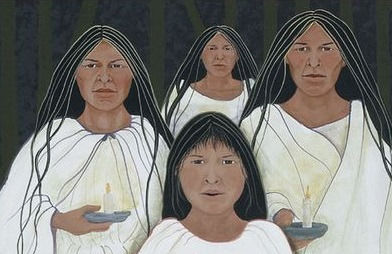Time of Wonder
- Dawn
- Oct 12, 2022
- 4 min read
Anti-Anxiety Tool of the Week: Jiggling

This is one of my favorite ways to reduce stress. Just jiggle your entire body, gently but loosely. Or jiggle as much of you as it feels comfortable to jiggle. Flap your hands. And legs. And arms. Wiggle your torso. It works best if you jiggle pretty fast...maybe 130-140 times a minute. Okay, so probably you shouldn't jiggle your head that fast, or even much at all. But you could think of horselips as lip-jiggling.
Jiggling is playful, helps us not take ourselves so seriously, and discharges some of that fight-flight energy. As with all zapchen exercises, do it a little, then rest a little, then do some more, then rest. And only if you want to.
This tool is from the second Toolkit. Here's the Index of all toolkits. And The Mini-Toolkit: For Those with Little or No Time.
Time of Wonder
Those of you who read this blog regularly know that I love children's books and have written about one or another of them a number of times. But have I mentioned my all-time favorite picture book?

That honor goes to Time of Wonder by Robert McCloskey, which won the Caldecott Medal in 1958 for the "most distinguished" picture book of the year. You may be familiar with McCloskey's first Caldecott winner, Make Way for Ducklings. Or perhaps with one of his three Caldecott runners-up, Blueberries for Sal, One Morning in Maine, or JourneyCake, Ho! Or his comical tall tale, Burt Dow: Deep Water Man. McCloskey also wrote and illustrated two of my favorite chapter books--Homer Price and Centerburg Tales: More Adventures of Homer Price. A very talented man.
E.B. White, who transplanted his young family to Maine from New York City, once said "I'd rather feel bad in Maine than good anywhere else." Time of Wonder may help you understand why.
It tells the story of a family's iconic summer on a small island in Penobscot Bay, Maine. McCloskey's lovely watercolors are slightly primitive, which heightens the archetypal, yet playful, feel of the book.
And his prose is delightful, incorporating a sing-song repetition, rooted in the rhythms--and surprises--of nature and time.
Out on the islands that poke their rocky shores above the waters of Penobscot Bay, you can watch the time of the world go by, from minute to minute, hour to hour, from day to day, season to season.
You can watch a cloud peep over Camden Hills, thirty miles away across the bay–see it slowly grow and grow as it comes nearer and nearer; see it darken the hills with its shadow; and then, see it darken, one after the other, Islesboro, Western Island, Pond Island, Hog Island, Spectacle Island, Two Bush Island–darken all the islands in between, until...

you, on your island, are standing in the shadow, watching the rain begin to spill down way across the bay.
The rain comes closer and closer. Now you hear a million splashes. Now you even see the drops on the water...on the age-old rocky point...on the bayberry...on the grass...Now take a breath–
IT’S RAINING ON YOU!
You probably noticed that the book is written in the present tense, second person. Used more frequently in children's books than for adults, it is still an unusual choice. In less skilled hands it could have been awkward or artificial, but McCloskey uses it to develop a special intimacy with the reader, which offers a nice counterbalance to the vastness and power of sea and sky.
The story roams through the seasons, beginning with early spring, where in the quiet of the woods you can hear "that other sound...the one like half a whisper...the sound of growing ferns, pushing aside dead leaves."
Summertime brings friends who dive and play in the water surrounding an outcropping of ancient rock, then during the afternoon's low tide build sandcastles,
below the spot where they had belly-whoppered and dog-paddled during the morning.
In the evening when the tide is high again, and all your guests have gone, you row around to the point, feeling lonely, until an owl asks a question. A heron croaks an answer....By the rock, you shine a light down into the water. There is a crab on the bottom where you were playing this afternoon. He tiptoes sideways through the castle gate and disappears into its watery keep.
As summer shifts towards fall, colors begin to migrate from greens and blues to golds and russets. The weather becomes very changeable, and the old-timers sense a storm coming:
We're going to have some weather.
It's a comin'.
She's gonna blow....
Gently at first the wind begins to blow.
Gently at first the rain begins to fall.
Suddenly the wind whips the water into sharp choppy waves. It tears off the sharp tops and and slashes them into ribbons of smoky spray....
A tree snaps. Above the roar of the hurricane you see and feel but do not hear it fall.
A latch gives way. People and papers and parcheesi games are puffed hair-over-eyes across the floor, while Father pushes and strains to close and bolt out the storm.

They make it through the storm, of course, though many of their trees do not.
Then all too soon
it is time to reset the clock from the rise and fall of the tide, to the come and go of the school bus....A little bit sad about about the place you are leaving, a little bit glad about the place you are going.
It is a time of quiet wonder--for wondering, for instance: Where do hummingbirds go in a hurricane?
Until next time,
with quiet wonder,
Dawn

Art credits:
Robert McCloskey (photos by DEH)





Comments